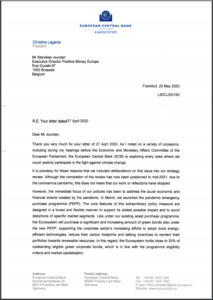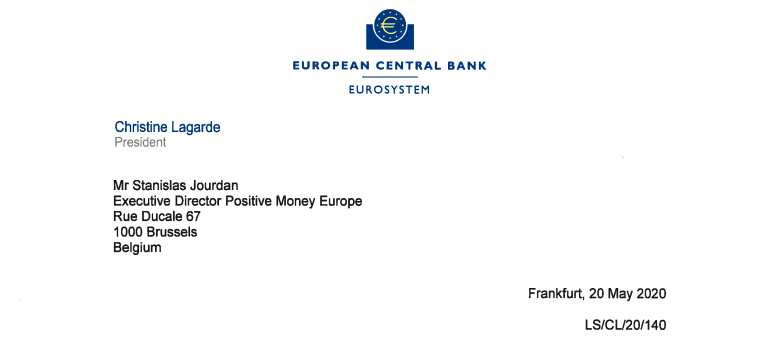The President of the European Central Bank wrote a letter to Positive Money Europe promising that the ECB has not stopped its reflection on climate change due to the pandemic.
As Eurozone countries imposed lockdowns to halt the spread of the coronavirus, the ECB had to act to ensure the economic crisis caused by the lockdown did not also morph into a debt crisis, for the time being at least. The ECB acted by promising to inject more than €1.1 trillion in quantitative easing into the Eurozone economy, by purchasing debt from governments and companies.
But by not placing environmental conditions on this funding, the ECB risks fuelling tomorrow’s climate crisis when acting to limit the economic damage caused by Covid-19 today.
On 27 April, 45 think tanks and civil society organisations, including Positive Money Europe, sent a letter to ECB President Christine Lagarde demanding that the danger which the climate crisis poses to the European and global economy be treated with the same immediacy as Covid-19.
 On 20 May, Christine Lagarde replied to our letter, which you can read here. In particular, the ECB President writes that despite the postponement of the ECB’s strategic review “this does not mean that our work or reflections [on climate change] have stopped”.
On 20 May, Christine Lagarde replied to our letter, which you can read here. In particular, the ECB President writes that despite the postponement of the ECB’s strategic review “this does not mean that our work or reflections [on climate change] have stopped”.
Lagarde reiterates the ECB’s commitment to involving all stakeholders in this discussion, mentioning as an example that the ECB’s supervision branch has launched a consultation on a future guide about climate-related and environmental risks. This is an interesting initiative but is not part of the ECB’s review on monetary policy since it concerns the ECB’s supervisory tasks.
The letter does not pledge to take immediate steps to ensure new monetary policy measures taken by the ECB are climate-friendly. This is despite Lagarde providing some reassurance on the ECB’s long term commitment to fighting climate change, such as how the Pandemic Emergency Purchase Programme will be aligned in the longer term with the EU’s climate objectives.
One simple action the ECB could take is to provide a transparent analysis on the climate impacts of the measures it is adopting. As proposed in our 2019 report, a first step on this would be to make carbon emission reporting requirements compulsory for firms to be eligible to the ECB’s quantitative easing programme – a proposal recently echoed by the Dutch national bank.
By taking this sort of action now, the ECB would ensure that the delay in its upcoming strategic review can be compensated with the quicker implementation of future policies designed to fight the climate crisis.

